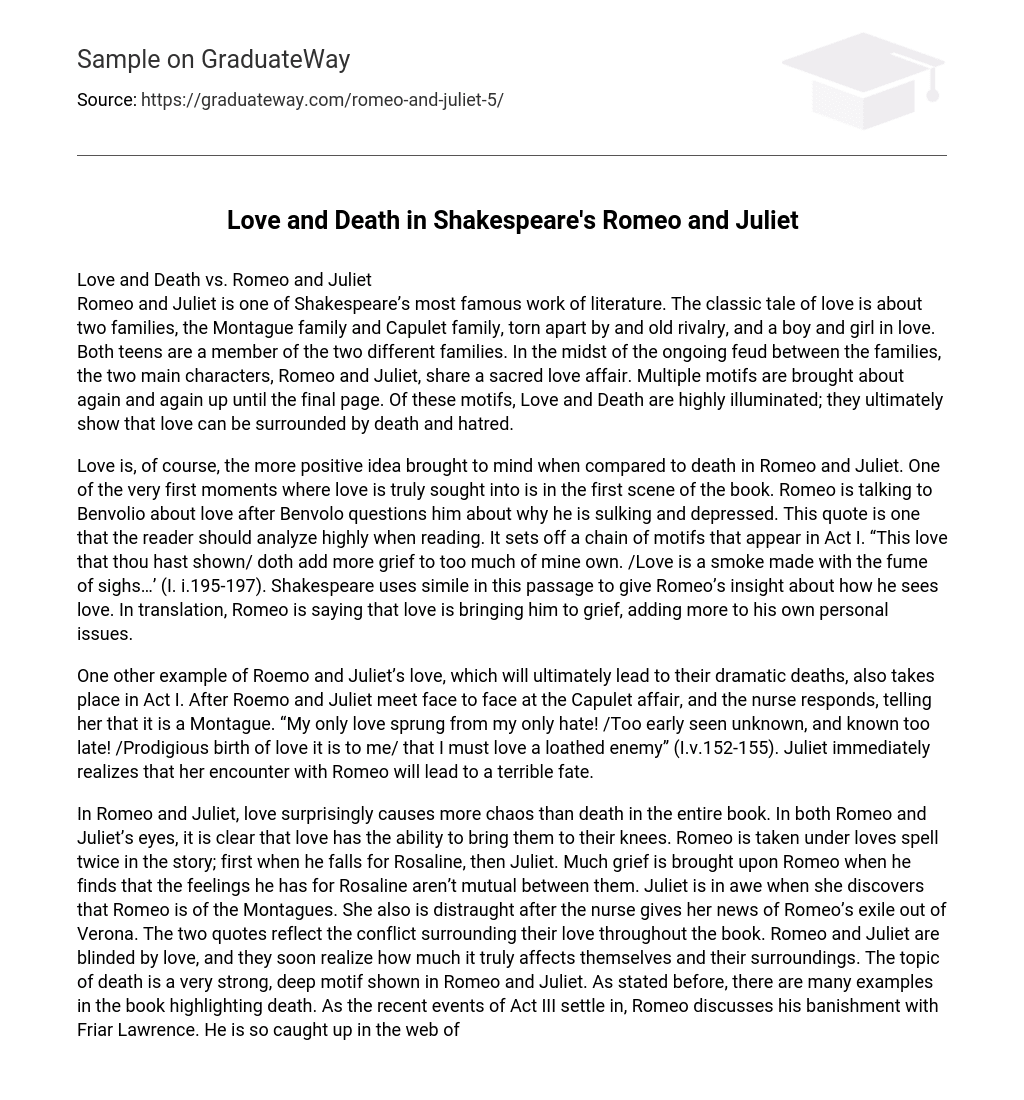Love and Death in Romeo and Juliet
Shakespeare’s well-known play, Romeo and Juliet, is a celebrated piece of literature. This timeless story centers on the Montagues and Capulets, two feuding families, and the love between a young man and woman who belong to opposing sides. Despite their families’ ongoing animosity, Romeo and Juliet share a profound romance. The narrative consistently explores themes like Love and Death that emphasize how love can persist even amidst death and hostility.
Love is portrayed as a more positive concept in Romeo and Juliet when compared to death. In the first scene of the book, Romeo discusses love with Benvolio after being asked about his sullen and depressed demeanor. The reader should closely analyze this quote as it introduces motifs that reappear throughout Act I. “This love that thou hast shown/ doth add more grief to too much of mine own. /Love is a smoke made with the fume of sighs…” (I. i.195-197). Shakespeare employs simile in this passage to convey Romeo’s perception of love. Essentially, Romeo expresses that love is causing him sorrow and exacerbating his personal problems.
In Act I, another instance of Romeo and Juliet’s love can be seen, which ultimately leads to their tragic deaths. This occurs when Romeo and Juliet come face to face at the Capulet affair and the nurse informs Juliet that Romeo is a Montague. Juliet exclaims, “My only love sprung from my only hate! /Too early seen unknown, and known too late! /Prodigious birth of love it is to me/ that I must love a loathed enemy” (I.v.152-155). This revelation makes Juliet immediately realize that her encounter with Romeo will result in a terrible fate.
In Romeo and Juliet, love surprisingly causes more chaos than death in the entire book. It is clear that love has the ability to bring both Romeo and Juliet to their knees. Romeo falls deeply in love with Rosaline and later with Juliet. However, he grieves when he realizes that his feelings for Rosaline are not reciprocated. Juliet is astonished to learn that Romeo is a Montague, and she becomes distraught when the nurse tells her about Romeo’s exile from Verona. These quotes reflect the conflicts surrounding their love throughout the book. Love blinds Romeo and Juliet, and they eventually realize how profoundly it affects themselves and their surroundings. Death is also a dominant motif in Romeo and Juliet. The book contains many examples highlighting death, particularly in Act III when Romeo discusses his banishment with Friar Lawrence. So consumed by love, Romeo would rather give up his life than be separated from Juliet.
Romeo expresses his belief that banishment is worse than death, saying, “Hence ‘banished’ is ‘banished from the world,’ / And world’s exile is death. Then ‘banished,’ / Thou cutt’st my head off with a golden ax / And smilest upon the stroke that murders me” (III.iii.20-24). This means that being separated from Juliet and his life is more agonizing to Romeo than dying. These intense emotions in Romeo’s words are mirrored by Juliet later in Act III, when Lady Capulet informs her that she will marry Paris the following Thursday. Juliet responds, “I pray to you, tell my lord and father, madam, / I will not marry yet, and when I do I swear / It shall be Romeo, whom you know I hate, / Rather than Paris-” (III.v.125-128). Juliet sees this as choosing to marry Romeo (who is seen as her enemy because of Tybalt’s death) over Paris. Juliet means this literally because ironically, she is already married to Romeo instead of Paris.
Death is a recurring theme in the story, with different meanings each time. In Act III, Romeo and Juliet face numerous challenges to their relationship. Despite getting married and uniting their feuding families, the rivalry between the Montagues and Capulets persists. Romeo gets into a violent altercation with Tybalt on the street, resulting in Tybalt’s death and the death of Benvolio in the same conflict. The Prince’s punishment for Romeo is banishment from the city. Before facing his ruling, Romeo spends one last night with Juliet. A significant and symbolic moment occurs the following morning when Romeo must leave Verona due to his banishment. As they bid farewell, Juliet notices something about Romeo’s appearance and comments, “I see thee, now thou art so low, /As one dead in the bottom of a tomb /Either my eyesight fails or thou lookest pale” (III.v.55-57). This quote foreshadows the tragic fate of Romeo and Juliet as they are never able to see each other alive again. It is ironic that Juliet describes Romeo as appearing pale because they ultimately die together inside a tomb.
The tragic ending of Romeo and Juliet is alluded to and foreshadowed in several parts of the play. It is regrettable that the unwavering love between the two leads to their demise. When they remark on their paleness, it emphasizes the idea that their fate is predetermined and that they are destined to die for their love. Gradually, it becomes increasingly evident that death is unavoidable for Romeo and Juliet.
The themes of Love and Death are prominent in this narrative. In summary, the relationship between Romeo and Juliet is filled with tragedy as evident in both positive and negative situations. Despite the hostility and hatred between their families, Romeo and Juliet are willing to give up their lives for each other, while the ongoing feud between the Montagues and the Capulets plays a significant role in the violence and sorrow that occurs. It is clear that death ultimately surrounds love in the melancholic story of Romeo and Juliet.
The citation for “The Tragedy of Romeo and Juliet” by Shakespeare is:
Shakespeare, William, Barbara A. Mowat, and Paul Werstine. The Tragedy of Romeo and Juliet. New York: Washington Square, 1992. Print.





